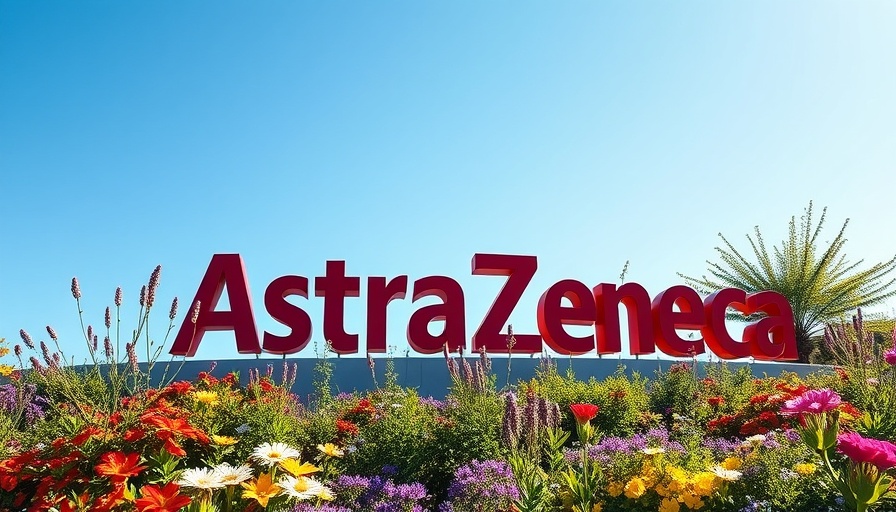
Summit and AstraZeneca Join Forces, Challenging Merck’s Keytruda in Oncology

5 Views
0 Comments

Kakistocracy in Pharma: Understanding Its Impact on Drug Development
Update The Rise of Kakistocracy in the Pharmaceutical IndustryIn recent years, the term "kakistocracy"—which refers to a government run by the least qualified or most unprincipled individuals—has become increasingly relevant to various sectors, especially the pharmaceutical industry. As we navigate an era defined by rapid technological advancements and evolving regulations, the implications of suboptimal management practices can be profound. The healthcare landscape demands strategic approaches and sound leadership, yet at times, it may feel as if the least competent are in charge.Understanding Kakistocracy: A Growing Threat?At its core, kakistocracy represents a troubling trend that undermines the integrity of our industries. Within pharmaceuticals, mismanagement can directly impact drug development, marketing strategies, and ultimately patient outcomes. The stakes are high; a lack of efficient leadership could lead to delays in drug launches or even subpar medications reaching patients, ultimately threatening public health.Insights from Industry ExpertsMany experts in the pharma landscape see a need for a shift in company cultures—promoting transparency, accountability, and proficiency in managerial roles. As the market evolves, so must our approaches. Knowledge-sharing and collaboration can counterbalance the risks associated with kakistocratic leadership. As noted in various pharma news outlets, companies that prioritize training and development of their workforce yield better results in terms of sales and patient engagement.Identifying the Risks: Why Competence MattersThe pharmaceutical sector is no stranger to challenges, including stringent regulatory environments and intense competition. Recent trends indicate that companies embracing advanced technologies—such as data analytics for market access and drug pricing strategies—are better positioned to succeed. However, without competent leadership steering these initiatives, efforts can quickly become chaotic, highlighting the importance of effective management in navigating the complex drug market.Cultivating Leadership for the FutureMoving forward, it is critical for leaders to embrace innovative business models tailored to the rapidly changing environment. This includes reevaluating talent acquisition strategies. Pharmaceutical recruiting should focus on identifying individuals who not only possess the necessary technical skills but are also capable of enforcing ethical practices and championing organizational values. Such a transformation could mitigate the risk of kakistocratic behaviors that ultimately affect the drug pipeline and patients.Strategies to Combat Kakistocratic Leadership1. **Training and Development**: Companies must invest heavily in ongoing training and professional development, ensuring team leaders are equipped with the necessary skills to manage effectively. This can lead to improved team productivity and better decision-making. 2. **Promote Accountability**: Establishing clear expectations and consequences for leadership roles is critical. Ensuring that leaders are held accountable can reduce instances of incompetence impacting company performance.3. **Encourage Open Communication**: Cultivating an environment where feedback is welcomed can empower employees. This not only increases morale but enables management to address issues before they escalate.Conclusion: A Call to ActionThe future of the pharmaceutical industry lies in recognizing and countering kakistocracy within corporate structures. By fostering a competent workforce and promoting ethical practices, pharmaceutical companies can mitigate risks associated with ineffective leadership. Now is the time for industry stakeholders to advocate for these changes, ensuring that the management of healthcare aligns with the high standards required to benefit patients and society at large.As we navigate this transformation, remember that the onus is on each of us within the pharmaceutical community to advocate for better leadership practices. Lobby your networks and engage with healthcare innovations to shape a robust future for our industry.

The Impact of Pfizer's Clinical Trial Failure on the Biotech Industry
Update Pfizer's Sickle Cell Drug Fails: A Significant Setback in BiotechIn a disappointing turn for the biotech industry, Pfizer's experimental treatment for sickle cell disease has failed its latest clinical trial, raising alarms across the pharmaceutical landscape, particularly among pharmaceutical sales reps and executives. This failure is a stark reminder of the unpredictability within drug development and the complexities inherent in biotech.Analyzing the Impact of Clinical Trial FailuresClinical trials are the bedrock of pharmaceutical advancement, but they come with inherent risks. The news of Pfizer's failure emphasizes the hurdles that biotech companies must navigate, often resulting in significant financial repercussions. For sales teams, this can influence their strategies and require a reevaluation of product positioning in the market, especially when a potential game-changer falls short.Reactions from the Pharmaceutical LandscapeThe news of Pfizer's failed trial has sparked varied reactions from pharmaceutical marketers and executives. Some industry leaders are calling for a robust discussion on the need for innovation in drug development. This event underscores the wider challenge of unmet medical needs in the sickle cell arena, where effective treatments remain scarce. Such discussions will likely influence strategies for future drug launch announcements, particularly emphasizing the importance of trial design and patient engagement in the process.The Future of Sickle Cell Treatments and Pharma StrategiesDespite this failure, many in the industry remain optimistic about future developments in sickle cell therapies. The biotech industry is characterized by its resilience; history shows that failures often pave the way for breakthroughs. Leading firms may pivot their focus on research and development (R&D) initiatives to find innovative solutions. This could encourage pharma organizations to rethink their drug pipelines and how they can address both investor concerns and market demands.Market Dynamics: Lessons from Pfizer's Trial FailurePfizer's setback is also a critical case study for pharmaceutical sales leaders and marketers. The incident highlights the necessity of understanding market trends and adjustable strategies concerning drug pricing and market access. Companies must be prepared to accept that not every pipeline drug will succeed and devise contingency plans for their sales forces accordingly. This may include aligning sales tactics with broader trends in specialty pharmacy growth and managing formulary decisions effectively.The Broader Implications for Patients and Healthcare ProvidersUltimately, the implications of Pfizer’s trial failure also extend to the patients reliant on effective treatments. Sickle cell disease significantly impacts quality of life, and the industry’s focus must remain on finding viable therapies. For healthcare providers, continued education about alternative treatments and familiarity with disease management strategies will become increasingly paramount as the landscape evolves.Concluding Thoughts on Drug Development DynamicsWhile the failure of Pfizer’s sickle cell drug remains a setback, it also serves as a catalyst for discussions regarding future drug development. For those within the pharmaceutical industry, now is the time to assess strategies, embrace innovation, and maintain focus on patient outcomes as they navigate the challenging waters of drug commercialization. As this industry continues to evolve, staying informed about clinical trial updates and market dynamics will be essential for all stakeholders involved.

Why Journal Impact Factors Are Misleading in Pharma Research Insights
Update Breaking Down the Journal Impact Myth The notion of journal impact factors has long been a central pillar in the academic and pharmaceutical research community, but it's time to address the growing skepticism surrounding their true value. Impact factors are designed to measure the frequency with which articles in a journal have been cited, but many experts are questioning whether this metric accurately reflects the quality and relevance of scientific research. In an era marked by rapid advancement in biotechnology and pharmaceuticals, relying on outdated or flawed metrics can lead to misguided decisions regarding drug development and marketing strategies. Understanding the Flaws in Current Metrics Many professionals within the pharmaceutical industry, including pharmaceutical sales reps and executives, must navigate an overwhelming array of scientific publications to make decisions that can influence drug launch announcements and market access strategies. However, as discussions around the journal impact factor intensify, it raises critical questions about the measurement tools we use in evaluating research. A consistent critique is that impact factors favor sensational or trending topics, often sidelining impactful work that may take longer to yield recognition. The Consequences of Misplaced Trust in Impact Factors Misplaced trust in journal impact metrics can have significant repercussions in the pharmaceutical sector. Executives might prioritize high-impact journals for drug commercialization strategies, neglecting relevant research published elsewhere. This could ultimately hinder the ability of companies to innovate effectively. Furthermore, such reliance can contribute to skewed perceptions within the healthcare field, as clinical trial updates and drug development news are often tied to these metrics. Voices from the Industry Industry leaders and researchers are increasingly pushing for a broader evaluation of research effectiveness, advocating for enhanced metrics that take into account the actual impact on patient care or healthcare outcomes rather than just citation rates. This shift could promote new pharma marketing strategies that align better with real-world applicability, helping pharmaceutical marketers connect with key opinion leaders more effectively. Lessons from Biotech and Pharma’s Evolving Landscape The biotech industry has been particularly quick to adapt to new realities, utilizing alternative metrics and innovative metrics such as patient engagement and adherence strategies. By focusing on the tangible contributions of research to overcoming healthcare challenges, industry players can foster stronger connections with healthcare providers and enhance value-based care initiatives. This shift is essential as companies prioritize patient-first approaches and emphasize the relevance of their products in solving real-world issues. Looking Toward the Future of Research Assessment As pharmaceutical innovations continue to emerge, there is a growing need for more reliable indicators of research impact. Future predictions indicate that as the pressure for transparency and accountability increases within the pharma sector, organizations will need to adopt a more holistic view of research evaluation. This includes looking at a broader interplay of factors that affect drug formulary negotiations, healthcare provider targeting, and specialty pharmacy growth. Call to Action Pharmaceutical professionals are encouraged to rethink their reliance on traditional journal impact factors. By actively engaging with emerging research evaluation metrics and methodologies, the industry can foster sustainable innovation and improve outcomes that truly resonate with patients and healthcare systems alike. Conclusion Ultimately, to stay ahead in this rapidly evolving landscape, pharmaceutical stakeholders must champion a new vision for research assessment—one that values the quality, relevance, and real-world impact of scientific contributions over antiquated metrics. By doing so, they will not only enhance their brand management strategies but also significantly impact patient care and the overall drug commercialization landscape.
 Add Row
Add Row  Add
Add 

Write A Comment